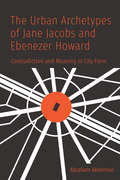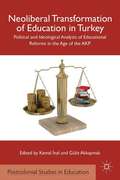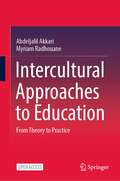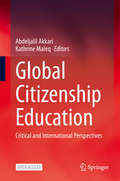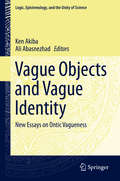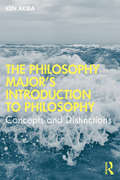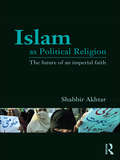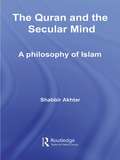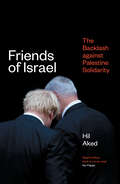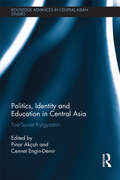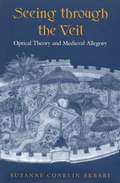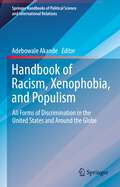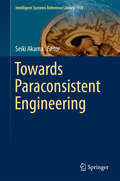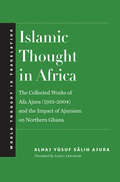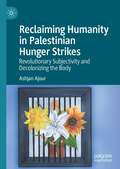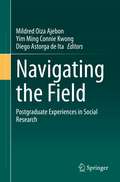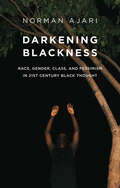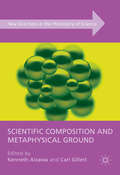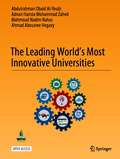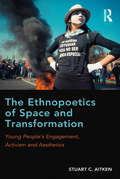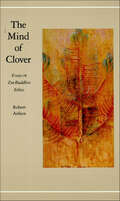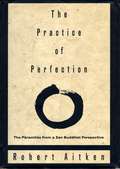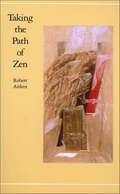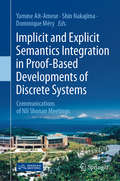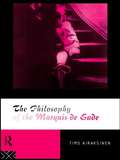- Table View
- List View
The Urban Archetypes of Jane Jacobs and Ebenezer Howard: Contradiction and Meaning in City Form (G - Reference, Information And Interdisciplinary Subjects Ser.)
by Abraham AkkermanEbenezer Howard, an Englishman, and Jane Jacobs, a naturalized Canadian, personify the twentieth century’s opposing outlooks on cities. Howard had envisaged small towns, newly built from scratch, fashioned on single family homes with small gardens. Jacobs embraced existing inner-city neighbourhoods emphasizing the verve of the living street. From Howard’s idea, the American Dream of garden suburbs had emerged, yet his conceptualization of a modern city received criticism for being uniform and alienated from the rest of the city. Similarly, at the turn of the new century, Jacobs’ inner-city neighbourhoods came to be recognized as the result of commodification, vacillating between poverty and newly discovered hubs of urban authenticity. Presenting Howard and Jacobs within a psychocultural context, The Urban Archetypes of Jane Jacobs and Ebenezer Howard addresses our urban crisis in the recognition that "city form" is a gendered, allegorical medium expressing femininity and masculinity within two founding features of the built environment: void and volume. Both founding contrasts bring tensions, but also the opportunities of fusion between pairs of urban polarities: human scale against superscale, gait against speed, and spontaneity against surveillance. Jacobs and Howard, in their respective attitudes, have come to embrace the two ancient archetypes, the Garden and the Citadel, leaving it to future generations to blend their two contrarian stances.
Neoliberal Transformation of Education in Turkey: Political and Ideological Analysis of Educational Reforms in the Age of the AKP (Palgrave Macmillan’s Postcolonial Studies in Education)
by Güliz Akkaymak Kemal İnalNeoliberal policies have had an impact on educational systems globally. This book provides a detailed and critical analysis of neoliberal educational policies and reforms in Turkey by focusing on the Justice and Development Party's reform efforts over the last eight years.
Intercultural Approaches to Education: From Theory to Practice
by Abdeljalil Akkari Myriam RadhouaneThis open access book provides an analysis of contemporary societies and schools shaped by cultural diversity, globalization and migration. This diversity is necessarily reflected in education systems and requires the promotion of intercultural approaches able to improve learning processes and the quality of education. From an international and comparative perspective, this book first presents theoretical and conceptual foundations for seriously considering cultural diversity. The book also compares intercultural approaches and debates generated in countries as diverse as the United States, Canada, Brazil, Switzerland and France. For each national context, the book addresses both the historical roots of intercultural approaches and the concrete initiatives driven by educational policies for their implementation in schools and classrooms. Finally, the book presents discussions surrounding the treatment of linguistic or religious diversity in schools, the emergence of global citizenship education and the key role of teachers in intercultural approaches.This is an open access book.
Global Citizenship Education: Critical and International Perspectives
by Abdeljalil Akkari Kathrine MaleqThis open access book takes a critical and international perspective to the mainstreaming of the Global Citizenship Concept and analyses the key issues regarding global citizenship education across the world. In that respect, it addresses a pressing need to provide further conceptual input and to open global citizenship agendas to diversity and indigeneity. Social and political changes brought by globalisation, migration and technological advances of the 21st century have generated a rise in the popularity of the utopian and philosophical idea of global citizenship. In response to the challenges of today’s globalised and interconnected world, such as inequality, human rights violations and poverty, global citizenship education has been invoked as a means of preparing youth for an inclusive and sustainable world. In recent years, the development of global citizenship education and the building of students’ global citizenship competencies have become a focal point in global agendas for education, international educational assessments and international organisations. However, the concept of global citizenship education still remains highly contested and subject to multiple interpretations, and its operationalisation in national educational policies proves to be challenging. This volume aims to contribute to the debate, question the relevancy of global citizenship education’s policy objectives and to enhance understanding of local perspectives, ideologies, conceptions and issues related to citizenship education on a local, national and global level. To this end, the book provides a comprehensive and geographically based overview of the challenges citizenship education faces in a rapidly changing global world through the lens of diversity and inclusiveness.
Vague Objects and Vague Identity
by Ken Akiba Ali AbasnezhadThis unique anthology of new, contributed essays offers a range of perspectives on various aspects of ontic vagueness. It seeks to answer core questions pertaining to onticism, the view that vagueness exists in the world itself. The questions to be addressed include whether vague objects must have vague identity, and whether ontic vagueness has a distinctive logic, one that is not shared by semantic or epistemic vagueness. The essays in this volume explain the motivations behind onticism, such as the plausibility of mereological vagueness and indeterminacy in quantum mechanics and they offer various arguments both for and against ontic vagueness; onticism is also compared with other, competing theories of vagueness such as semanticism, the view that vagueness exists only in our linguistic representation of the world. Gareth Evans's influential paper of 1978, "Can There Be Vague Objects?" gave a simple but cogent argument against the coherence of ontic vagueness. Onticism was subsequently dismissed by many. However, in recent years, researchers have become aware of the logical gaps in Evans's argument and this has triggered a new wave of interest in onticism. Onticism is now widely regarded as at least a coherent view. Reflecting this growing consensus, the present anthology for the first time puts together essays that are focused on onticism and its various facets and it fills in the lacuna in the literature on vagueness, a much-discussed subject in contemporary philosophy.
The Philosophy Major’s Introduction to Philosophy: Concepts and Distinctions
by Ken AkibaMany philosophy majors are shocked by the gap between the relative ease of lower-level philosophy courses and the difficulty of upper-division courses. This book serves as a necessary bridge to upper-level study in philosophy by offering rigorous but concise and accessible accounts of basic concepts and distinctions that are used throughout the discipline. It serves as a valuable advanced introduction to any undergraduate who is moving into upper-level courses in philosophy. While lower-level introductions to philosophy usually deal with popular topics accessible to the general student (such as contemporary moral issues, free will, and personal identity) in a piecemeal fashion, The Philosophy Major’s Introduction to Philosophy offers coverage of important general philosophical concepts, tools, and devices that may be used for a long time to come in various philosophical areas. The volume is helpfully divided between a focus on the relation between language and the world in the first three chapters and coverage of mental content in the final two chapters, but builds a coherent narrative from start to finish. It also provides ample study questions and helpful signposts throughout, making it a must-have for any student attempting to engage fully with the problems and arguments in philosophy. Key Features Integrates topics from various areas of philosophy, such as philosophy of language, metaphysics, epistemology, ethics, and philosophical logic Provides descriptions of logico-mathematical tools necessary for philosophical studies, such as propositional logic, predicate logic, modal logic, set theory, mereology, and mathematical functions Makes connections with modern philosophy, including discussions of Descartes’s skepticism and dualism, Locke’s theory of personal identity, Hume’s theory of causation, and Kant’s synthetic a priori Includes well-known entertaining puzzles and thought experiments such as the Ship of Theseus, the Statue and the Clay, a Brain in a Vat, and Twin Earth Lists helpful Exercise Questions and Discussion Questions at the end of each chapter and answers selected questions at the back of the book
Islam as Political Religion: The Future of an Imperial Faith
by Shabbir AkhtarThis comprehensive survey of contemporary Islam provides a philosophical and theological approach to the issues faced by Muslims and the question of global secularisation. Engaging with critics of modern Islam, Shabbir Akhtar sets out an agenda of what his religion is and could be as a political entity. Exploring the views and arguments of philosophical, religious and political thinkers, the author covers a raft of issues faced by Muslims in an increasingly secular society. Chapters are devoted to the Qur’an and Islamic literature; the history of Islam; Sharia law; political Islam; Islamic ethics; and political Islam’s evolving relationship with the West. Recommending changes which enable Muslims to move from their imperial past to a modest role in the power structures of today’s society, Akhtar offers a detailed assessment of the limitations and possibilities of Islam in the modern world. Providing a vision for an empowered yet rational Islam that distances itself from both Islamist factions and Western secularism, this book is an essential read for students and scholars of Islamic studies, religion, philosophy and politics.
The Quran and the Secular Mind: A Philosophy of Islam
by Shabbir AkhtarThis book is concerned with the rationality and plausibility of the Muslim faith and the Qur'an, and in particular how they can be interrogated and understood through Western analytical philosophy. It also explores how Islam can successfully engage with the challenges posed by secular thinking. The Quran and the Secular Mind will be of interest to students and scholars of Islamic philosophy, philosophy of religion, Middle East studies, and political Islam.
Friends of Israel: The Backlash Against Palestine Solidarity
by Hilary Frances AkedIs there such a thing as &“the Israel lobby,&” and how powerful is it really? Friends of Israel provides a forensically researched account of the activities of Israel&’s advocates in Britain, showing how they contribute to maintaining Israeli apartheid. The book traces the history and changing fortunes of key actors within the British Zionist movement in the context of the Israeli government&’s contemporary efforts to repress a rising tide of solidarity with Palestinians expressed through the Boycott Divestment and Sanctions (BDS) movement. Offering a nuanced and politically relevant account of pro-Israel actors&’ strategies, tactics, and varying levels of success in key arenas of society, it draws parallels with the similar anti-boycott campaign waged by supporters of the erstwhile apartheid regime in South Africa. By demystifying the actors involved in the Zionist movement, the book provides an anti-racist analysis of the pro-Israel lobby which robustly rebuffs anti-Semitic conspiracies. Sensitively and accessibly written, it emphasises the complicity of British actors - both those in government and in civil society. Drawing on a range of sources including interviews with leading pro-Israel activists and Palestinian rights activists, documents obtained through Freedom of Information requests and archival material, Friends of Israel is a much-needed contribution to Israel/Palestine-related scholarship and a useful resource for the Palestine solidarity movement.
Politics, Identity and Education in Central Asia: Post-Soviet Kyrgyzstan
by Pınar Akçalı Cennet Engin-DemirFocusing on the areas of politics, identity and education, this book looks at some of the most pressing and challenging issues that Kyrgyzstan faces in the post-Soviet era. It argues that Kyrgyzstan is challenged with oscillations between the old and the new on the one hand, and domestic and international on the other. The book analyses the process of post-Soviet transition in today’s Kyrgyzstan by focusing on the political elites, some of the major identity problems and educational issues. It discusses how Kyrgyzstan’s first president in the post-Soviet era had already been an exceptional leader even prior to the collapse of the Soviet Union in terms of his democratic and liberal tendencies. The book goes on to look at how identity is a major factor in the country, shaped to a large extent by genealogical factors and patron-client mechanisms on the one hand, and religious considerations on the other. Finally, it highlights how education has been perceived as a very influential agent of socialization that develops not only literacy and other skills, but also common attitudes and values that are considered essential to any society. By evaluating these three areas, the book argues that Kyrgyzstan cannot isolate itself from the demands, priorities and pressures of international actors, which sometimes are in conflict with the country’s domestic conditions. It is of interest to students and scholars of Asian Studies, Politics and International Relations.
Seeing Through the Veil
by Suzanne Conklin AkbariDuring the later Middle Ages, new optical theories were introduced that located the power of sight not in the seeing subject, but in the passive object of vision. This shift had a powerful impact not only on medieval science but also on theories of knowledge, and this changing relationship of vision and knowledge was a crucial element in late medieval religious devotion. In Seeing through the Veil, Suzanne Conklin Akbari examines several late medieval allegories in the context of contemporary paradigm shifts in scientific and philosophical theories of vision.After a survey on the genre of allegory and an overview of medieval optical theories, Akbari delves into more detailed studies of several medieval literary works, including the Roman de la Rose, Dante's Vita Nuova, Convivio, and Commedia, and Chaucer's dream visions and Canterbury Tales. The final chapter, 'Division and Darkness,' centres on the legacy of allegory in the fifteenth century. Offering a new interdisciplinary, synthetic approach to late medieval intellectual history and to major works within the medieval literary canon, Seeing through the Veil will be an essential resource to the study of medieval literature and culture, as well as philosophy, history of art, and history of science.
Handbook of Racism, Xenophobia, and Populism: All Forms of Discrimination in the United States and Around the Globe (Springer Handbooks of Political Science and International Relations)
by Adebowale AkandeThis handbook presents the roots of symbolic racism as partly in both anti-black antagonism and non-racial conservative attitudes and values, representing a new form of racism independent of older racial and political attitudes. By doing so, it homes in on certain historical incidents and episodes and presents a cogent analysis of anti-black, Jim Crowism, anti-people of color (Black, Latino, Native Americans), and prejudice that exists in the United States and around the world as a central tenet of racism. The book exposes the reader to the nature and practice of stereotyping, negative bias, social categorization, modern forms of racism, immigration law empowerment, racialized incarceration, and police brutality in the American heartland. It states that several centuries of white Americans’ negative socializing culture marked by widespread negative attitudes toward African Americans, are not eradicated and are still rife. Further, the book provides a panoramic view of trends of racial discrimination and other negative and desperate challenges that Black, Indigenous, and People of Color face across the world. Finally, the volume examines xenophobia, racism, prejudice, and stereotyping in different contexts, including topics such as Covid-19, religion and racism, information manipulation, and populism. The book, therefore, is a must-read for students, researchers, and scholars of political science, psychology, history, sociology, communications/media studies, diplomatic studies, and law in general, as well as ethnic and racial studies, American politics, global affairs, populism, and discrimination in particular.
Towards Paraconsistent Engineering
by Seiki AkamaThis book presents a collection of contributions from related logics to applied paraconsistency. Moreover, all of them are dedicated to Jair Minoro Abe,on the occasion of his sixtieth birthday. He is one of the experts in Paraconsistent Engineering, who developed the so-called annotated logics. The book includes important contributions on foundations and applications of paraconsistent logics in connection with engineering, mathematical logic, philosophical logic, computer science, physics, economics, and biology. It will be of interest to students and researchers, who are working on engineering and logic.
Islamic Thought in Africa: The Collected Works of Afa Ajura (1910-2004) and the Impact of Ajuraism on Northern Ghana (World Thought in Translation)
by Alhaj Yusuf Ajura Zakyi IbrahimThe first book length-work on Afa Ajura and translation of his complete poems This is the first English translation of and commentary on the collected poems of Alhaj YŠ«suf á¹¢Ä?liḥ Ajura (1910–2004), a northern Ghanaian orthodox Islamic scholar, poet, and polemicist known as Afa Ajura, or “scholar from Ejura.” The poems, all handwritten in Arabic script, mainly in the Ghanaian language of Dagbani and also Arabic, explore the author’s socio†‘religious beliefs. In the accompanying introduction, the translator examines the diverse themes of the poems and how they challenge TijÄ?niyyah Sufi clerics and traditional practices such as idol worship.
Reclaiming Humanity in Palestinian Hunger Strikes: Revolutionary Subjectivity and Decolonizing the Body
by Ashjan AjourRooted in feminist ethnography and decolonial feminist theory, this book explores the subjectivity of Palestinian hunger strikers in Israeli prisons, as shaped by resistance. Ashjan Ajour examines how these prisoners use their bodies in anti-colonial resistance; what determines this mode of radical struggle; the meanings they ascribe to their actions; and how they constitute their subjectivity while undergoing extreme bodily pain and starvation. These hunger strikes, which embody decolonisation and liberation politics, frame the post-Oslo period in the wake of the decline of the national struggle against settler-colonialism and the fragmentation of the Palestinian movement. Providing narrative and analytical insights into embodied resistance and tracing the formation of revolutionary subjectivity, the book sheds light on the participants’ views of the hunger strike, as they move beyond customary understandings of the political into the realm of the ‘spiritualisation’ of struggle. Drawing on Foucault’s conception of the technologies of the self, Fanon’s writings on anti-colonial violence, and Badiou’s militant philosophy, Ajour problematises these concepts from the vantage point of the Palestinian hunger strike.
Navigating the Field: Postgraduate Experiences in Social Research
by Mildred Oiza Ajebon Yim Ming Connie Kwong Diego Astorga de ItaThis volume is a collation of postgraduate fieldwork experiences in social research that provides a platform for early career researchers (ECRs) to be open about the hidden labour of doing postgraduate fieldwork. This book documents diverse fieldwork experiences, gathering critical reflections on ‘the field’ from a wide range of ECRs. The issues presented here go from the process of identifying the field to navigating life in (and after) it, including things that happen in-between. This text shows a different set of methodological considerations in relation to access, ethics, identity, positionality, power and practices, highlighting how ECRs' fieldwork experiences may help broaden traditional frameworks of research. Exploring how postgraduate researchers make sense of these issues and what kind of decisions they make in specific circumstances helps to reveal broader concerns, institutional practices and constraints. Through these reflections, this book makes an important point that there is a need for researchers to document the ‘real story’ behind fieldwork. The honesty and openness of contributors in this volume are positive steps towards fostering a research culture where reflections upon weaknesses and failures are as welcome as presentations of successful fieldwork techniques and methods.The fact that this book is written and edited by ECRs, the topics it presents — both emerging and long-debated but still relevant — and the broad range of approaches make this text unique. We hope these points will make this work useful for researchers of all levels and across disciplines, and that this text will allow the reader to rethink some essential aspects of social research that are often taken for granted. We expect the diverse reflections offered in this book to appeal to researchers across disciplines at different stages of their career and that this will be a useful resource for researchers to map and navigate their own research pathways.
Darkening Blackness: Race, Gender, Class, and Pessimism in 21st-Century Black Thought
by Norman AjariThe concept of Afropessimism does not refer to Black people, but rather to the likelihood of white society overcoming its own negrophobia, and to a radical distrust in white narratives of inclusivity. What if the ideas and reforms we regard as progressive were just the new and shiny face of racism? In the time of Black Lives Matter, the unswerving dehumanization and killing of Black people form the bedrock of our civilization. But a vast anti-Black collective feeling also manifests itself as a more insidious shared unconscious, hidden from view by the doctrines we deem as emancipatory. This book challenges the simplistic and pacifying aspects of current African American thought. It puts forward alternatives to intersectionality, poststructuralism, and radical democracy, which are often prioritized in the Black analysis of race, gender, and class. Accessible, historically informed, and politically alert, this book offers a critical analysis of the groundbreaking theories and strategies that radically reimagine the future of Black lives throughout the world.
Scientific Composition and Metaphysical Ground
by Kenneth Aizawa Carl GillettWe find "vertical"relations in many different realms, whether between atoms and molecules, wordsand sentences, neurons and brains, or individuals and societies. This book isthe first to bring together, and comparatively assess, the exciting array ofphilosophical approaches to vertical relations that have independently sprungup in analytic metaphysics, the metaphysics of mind, and the philosophy ofscience. Analytic metaphysicians have recentlyfocused on a relation of 'Ground' that is claimed to be found in aesthetics,ethics, logic, mathematics, science, and semantics. Metaphysicians of mind have focussed on avertical relation of 'realization' between properties, whilst philosophers ofscience associated with the rise of the 'New Mechanism' have renewed interestin vertical relations of scientific composition found in so-called "mechanisticexplanations". This volume analyses the inter-relations between these differentapproaches to spark a range of new debates, including whether the variousframeworks for vertical relations are independent, complementary or in even competition.
The Leading World’s Most Innovative Universities
by Abdulrahman Obaid AI-Youbi Adnan Hamza Zahed Mahmoud Nadim Nahas Ahmad Abousree HegazyThis open access book is unique in its contents. No other title in the book market has tackled this important subject. It introduces innovation as a way of practice for world-class universities. It, then, discusses the criteria for being innovative in the academic world. The book selects some of the top innovative world-class universities to study the factors that qualified them to be innovative, so that any other university can follow their steps to become innovative. The final chapter of the book presents some recommendations in this regard.
The Ethnopoetics of Space and Transformation: Young People’s Engagement, Activism and Aesthetics
by Stuart C. AitkenChange is inevitable, we are told. A job is lost, a couple falls in love, children leave home, an addict joins Narcotics Anonymous, two nations go to war, a family member's health deteriorates, a baby is born, a universal health care bill is voted into law. Life comprises events over which we have considerable, partial, or little or no control. The distance between the event and our daily lives suggests a quirky spatial politics. Our lives move forward depending upon how events play out in concert with our reactions to them. Drawing on nearly three decades of geographic projects that involve ethnographies and interviews with, and stories about, young people in North and South American, Europe and Asia and using the innovative technique of ethnopoetry, Aitken examines key life-changing events to look at the interconnections between space, politics, change and emotions. Analysing the intricate spatial complexities of these events, he explores the emotions that undergird the ways change takes place, and the perplexing spatial politics that almost always accompany transformations. Aitken positions young people as effective agents of change without romanticizing their political involvement as fantasy and unrealistic dreaming. Going further, he suggests that it is the emotional palpability of youth engagement and activism that makes it so potent and productive. Pulling on the spatial theories of de Certeau, Deleuze, Massey, Agamben, Rancière, Zizek and Grosz amongst others, Aitken argues that spaces are transformative to the degree that they open the political and he highlights the complexly interwoven political, economic, social and cultural practices that simultaneously embed and embolden people in places. If we think of spaces as events and events encourage change, then spaces and people become other through complex relations. Taking poetry to be an emotive construction of language, Aitken re-visualizes, contorts and arranges people's words and gestures to
The Mind of Clover: Essays in Zen Buddhist Ethics
by Robert AitkenIn Taking the Path of Zen, Robert Aitken provided a concise guide to zazen (Zen meditation) and other aspects of the practice of Zen. In The Mind of Clover he addresses the world beyond the zazen cushions, illuminating issues of appropriate personal and social action through an exploration of the philosophical complexities of Zen ethics. Aitken's approach is clear and sure as he shows how our minds can be as nurturing as clover, which enriches the soil and benefits the environment as it grows. The opening chapters discuss the Ten Grave Precepts of Zen, which, Aitken points out, are "not commandments etched in stone but expressions of inspiration written in something more fluid than water." Aitken approaches these precepts, the core of Zen ethics, from several perspectives, offering many layers of interpretation. Like ripples in a pond, the circles of his interpretation increasingly widen, and he expands his focus to confront corporate theft and oppression, the role of women in Zen and society, abortion, nuclear war, pollution of the environment, and other concerns.The Mind of Clover champions the cause of personal responsibility in modern society, encouraging nonviolent activism based on clear convictions. It is a guide that engages, that invites us to realize our own potential for confident and responsible action.
The Practice of Perfection: The Paramitas from a Zen Buddhist Perspective
by Robert AitkenRobert Aiken, author of Encouraging Words and Taking the Path of Zen, is America's most senior Zen Roshi. In this new book he presents the Ten Pãramitãs, of Transcendental Perfections--namely, giving, mortality, forbearance, zeal, focused meditation, wisdom, compassionate means, aspiration, spiritual power, and knowledge--two-thousand-year-old ideals that can serve us as both methods and goals. The Pãramitãs are the "skillful means" a person may employ to nurture and develop his or her spiritual and moral life. In religious instruction we are often met be restrictions, and are told what not to do. The Pãramitãs, explained from a Zen perspective, offer the seeker ten positive means of action, ten ways to live a life of clarity and grace in a modern world where neither seems easy or even possible. The transcendental perfections can lead us toward a life that is both spiritually invigorated and socially engaged. Aitken Roshi's way of teaching--anecdotal, careful, insightful, and easily accessible--leads us further along the path of harmony and balance. Each of the inspiring and instructional essays in this book is followed by a section in which Aitken answers questions most often asked by his own students in their course of study. The Practice of Perfection will be useful to seekers of all cultures and faiths.
Taking the Path of Zen
by Robert AitkenThere is a fine art to presenting complex ideas with simplicity and insight, in a manner that both guides and inspires. In Taking the Path of Zen Robert Aitken presents the practice, lifestyle, rationale, and ideology of Zen Buddhism with remarkable clarity. The foundation of Zen is the practice of zazen, or mediation, and Aitken Roshi insists that everything flows from the center. He discusses correct breathing, posture, routine, teacher-student relations, and koan study, as well as common problems and milestones encountered in the process. Throughout the book the author returns to zazen, offering further advice and more advanced techniques. The orientation extends to various religious attitudes and includes detailed discussions of the Three Treasures and the Ten Precepts of Zen Buddhism. Taking the Path of Zen will serve as orientation and guide for anyone who is drawn to the ways of Zen, from the simply curious to the serious Zen student.
Implicit and Explicit Semantics Integration in Proof-Based Developments of Discrete Systems: Communications of NII Shonan Meetings
by Yamine Ait-Ameur Shin Nakajima Dominique MéryThis book addresses mechanisms for reducing model heterogeneity induced by the absence of explicit semantics expression in the formal techniques used to specify design models. More precisely, it highlights the advances in handling both implicit and explicit semantics in formal system developments, and discusses different contributions expressing different views and perceptions on the implicit and explicit semantics. The book is based on the discussions at the Shonan meeting on this topic held in 2016, and includes contributions from the participants summarising their perspectives on the problem and offering solutions. Divided into 5 parts: domain modelling, knowledge-based modelling, proof-based modelling, assurance cases, and refinement-based modelling, and offers inspiration for researchers and practitioners in the fields of formal methods, system and software engineering, domain knowledge modelling, requirement analysis, and explicit and implicit semantics of modelling languages.
The Philosophy of the Marquis de Sade
by Timo AiraksinenThe Marquis de Sade is famous for his forbidden novels like Justine, Juliette, and the 120 Days of Sodom. Yet, despite Sade's immense influence on philosophy and literature, his work remains relatively unknown. His novels are too long, repetitive, and violent. At last in The Philosophy of the Marquis de Sade, a distinguished philosopher provides a theoretical reading of Sade. Airaksinen examines Sade's claim that in order to be happy and free we must do evil things. He discusses the motivations of the typical Sadean hero, who leads a life filled with perverted and extreme pleasures, such as stealing, murder, rape, and blasphemy. Secondary sources on Sade, such as Hobbes, Erasmusm, and Brillat-Savarin are analyzed, and modern studies are evaluated. The Philosophy of the Marquis de Sade greatly enhances our understanding of Sade and his philosophy of pain and perversion.
